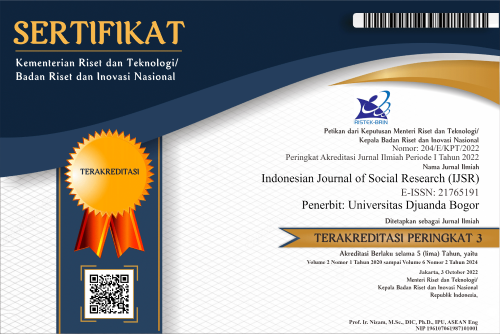A Critical Appraisal of The Role of Retribution in Aníkúlápó: The Movie
Abstract
This study examines Aníkúlápó, a Yoruba historical movie, to elucidate cultural perspectives on retributive justice. The study is grounded in the Yoruba worldview, which frames retribution as essential for restoring cosmic and social equilibrium when moral norms are violated. The data analysis used textual analysis of Aníkúlápó’s narrative depictions of crime and punishment as insights into traditional Yoruba principles of retributive justice. The findings reveal that the movie accurately portrays customary public punishment processes in precolonial Yoruba society aimed at communal justice and harmony. Beliefs in supernatural forces dispensing divine retribution are also authentically represented. While punishments seek to deter crime and rehabilitate offenders, scholarly critiques note occasional unfairness and excess. Overall, the analysis of the movie illuminates the pivotal role of retribution in Yoruba's cultural identity and moral philosophy. The key themes in the study relate to retribution's links to cosmic balance, supernatural dimensions, and functions as deterrence and rehabilitation. By situating the analysis of Aníkúlápó within scholarship on African jurisprudence, the study elucidates Yoruba perspectives on fate, choice, proportionality, and pragmatism when responding to moral complexities and wrongdoing. This study contributes original humanistic insight into indigenous African philosophies of social harmony beyond punitive justice. This study recommends comparing diverse narratives and contemporary attitudes to enrich the understanding retribution's nuanced cultural significance.
References
Afolayan, K. (Director). (2022). Aníkúlápó [Movie]. Netflix. https://www.netflix-movies.com/movie/1023994/an-iacute-k-uacute-l-aacute-p-oacute
Agunbiade, O. M. (2019). Explanations around physical abuse, neglect and preventive strategies among older Yoruba people (60+) in urban Ibadan Southwest Nigeria: A qualitative study. Heliyon, 5(11). ). https://doi.org/10.1016/j.heliyon.2019.e02888
Akin-Otiko, A., & Abbas, A. R. (2019). Return to African traditional religion after conversion to Christianity or Islam: Patronage of culture or religious conversion? Ilorin Journal of Religious Studies, 9(1), 27–36.
Anagwo, E. C. (2016). Rediscovering the Value of Initiation Rites: The African Perspective. The International Journal of Religion and Spirituality in Society, 6(4), 57. https://doi.org/10.18848/2154-8633/CGP/v06i04
Berg, B.L., & Howard, L. (2016). Qualitative Research Methods Fo Rthe Social Sciences. Pearson Education Limited.
Braithwaite, J. (2016). Restorative justice and responsive regulation: The question of evidence. RegNet Research Paper, 2016/51. http://dx.doi.org/10.2139/ssrn.2839086
Buell, S. W. (2020). Retiring Corporate Retribution. Law & Contemp. Probs., 83, 25.
Chemhuru, M. (2018). African communitarianism and human rights: Towards a compatibilist view. Theoria, 65(157), 37–56. . https://doi.org/10.3167/th.2018.6515704
de Almeida, A. M. (2017). A audiência de custódia e a justiça restaurativa na promoção da dignidade humana: Pelo perfilhamento da postura do estado democrático de direito. Revista Coleta Científica, 1(1), 28–67. . https://doi.org/10.5281/zenodo.4737550
Dorn, A. (2022). Just Reward: Just Punishment? Religious Norms, Norm Transgressions and Their Consequences in Xenophon’s Hellenica. In Transgression and Deviance in the Ancient World (pp. 39–65). Springer. https://doi.org/10.1007/978-3-476-05873-7_4
Đureinović, J. (2019). The politics of memory of the Second World War in contemporary Serbia: Collaboration, resistance and retribution. Routledge. https://doi.org/10.4324/9780429297939
Edgerton, R. B. (2022). Rules, exceptions, and social order. Univ of California Press. https://doi.org/10.1525/9780520347434
Falola, T., & Akinyemi, A. (Eds.). (2016). Encyclopedia of the Yoruba. Indiana University Press.
Fei, S. (2021). Universal credit and behaviour change: An investigation of universal credit’s influences on claimants’ benefit and employment behaviour change. (Doctoral dissertation, University of Nottingham). https://eprints.nottingham.ac.uk/64108/
Feng, L. (2021). How Buddhism Plays a Role through Victim-Offender Mediation in Handling the Challenges of Crime in China’s Tibet. Religions, 12(9), 699. https://doi.org/10.3390/rel12090699
Finnigan, B. (2022). Karma, moral responsibility, and Buddhist ethics. The Oxford Handbook of Moral Psychology, 7–23. https://doi.org/10.1093/oxfordhb/9780198871712.013.4
Hatzis, A. N. (2015). Moral externalities: An economic approach to the legal enforcement of morality. In Law and Economics (pp. 226–244). Routledge. https://doi.org/10.4324/9781315730882-12
Jakobsson, E. (2018). Transitional Justice–An analysis of restorative and retributive mechanisms in Sub-Saharan Africa. [Bachelor Thesis, Linnaeus University]. https://www.diva-portal.org/smash/get/diva2:1219578/FULLTEXT01.pdf
Laursen, J. (2016). Histories of Heresy in the Seventeenth and Eighteenth Centuries: For, Against, and Beyond Persecution and Toleration. Springer. https://doi.org/10.1057/9780230107496_1
Lawal, M. O., Irhue, Y. K., & Aliu, N. L. (2021). Discourse On Efe And Gẹlẹdẹ Spectacles In Contemporary Yorùbá Communities In Nigeria. Annals of the Constantin Brancusi University of Targu Jiu-Letters & Social Sciences Series, 2. https://heinonline.org/HOL/LandingPage?handle=hein.journals/ancnbt2021&div=55&id=&page=
Martínez Alles, M. G. (2018). Moral outrage and betrayal aversion: The psychology of punitive damages. Journal of Tort Law, 11(2), 245–303. https://doi.org/10.1515/jtl-2018-0003
Marwick, A. E. (2021). Morally motivated networked harassment as normative reinforcement. Social Media+ Society, 7(2). https://doi.org/10.1177/20563051211021378
Merguei, N., Strobel, M., & Vostroknutov, A. (2022). Moral opportunism as a consequence of decision making under uncertainty. Journal of Economic Behavior & Organization, 197, 624–642. . https://doi.org/10.1016/j.jebo.2022.03.020
Metz, T., & Metz, M. (2022). How Much Punishment Is Deserved? Two Alternatives to Proportionality. Philosophies, 7(2), 25. https://doi.org/10.3390/philosophies7020025
Oh, I. (2022). What is religious ethics?: An introduction. Taylor & Francis.
Okewande, O. T. (2019). Natural and supernatural human beings in African philosophy: A semiotic investigation of links between Ifá and Ìbejì among the Yorùbá. International Journal of Intellectual Discourse, 2(1), 12–22.
Olugbemi-Gabriel, O. (2020). History, Policy and Cultural Beliefs in Nigerian Video-Films: The Yoruba Film as Praxis. Islamic University Multidisciplinary JournalIUMJ, 7 (1), 97-103.
Onyibor, M. I. S., & Eegunlusi, T. R. E. (2019). A critique of traditional Igbo and Yorùbá moral perspectives on evil. Canadian Social Science, 15(3), 62–75. https://doi.org/10.3968/10966
Raffnsøe-Møller, M. (2015). 5 Dimensions of Freedom: Axel Honneth’s Critique of Liberalism. In Recognition and Freedom (pp. 101–123). Brill. https://doi.org/10.1163/9789004287341_007
Salcedo García, J. C. (2020). Moralistic punishment signaling as a function of proportionality. [Doctoral dissertation, Universidad de los Andes]. http://hdl.handle.net/1992/48393
Springs, J. A. (2022). Can Restorative Justice Transform Structural and Cultural Violence? The Wiley Blackwell Companion to Religion and Peace, 438–453. https://doi.org/10.1002/9781119424420.ch37
Stahn, C. (2020). Justice as message: Expressivist foundations of international criminal justice. Oxford University Press. https://doi.org/10.1093/oso/9780198864189.001.0001
Steinhoff, U. (2019). Self-defense, necessity, and punishment: A philosophical analysis. Routledge. https://doi.org/10.4324/9780367814441
Tume, T. K. (2019). Yoruba folkore and Ifa narratives in Tunde Kelani’s Agogo Eewo (2002) as cultural archetypes for national re-orientation. Journal of African Films and Diaspora Studies, 2(1), 23. https://doi.org/10.31920/2516-2713/2019/2n1a2
Uchendu, E. (2023). A Review of Nigerian Christians’ Response to the 2019 Witchcraft Conference. Eastern African Journal of Humanities and Social Sciences, 2(1), 76–93. https://doi.org/10.58721/eajhss.v2i1.321
Vos, G. P. (2023). Thetis and Callimachus’ Hymn to Apollo: Dynasty and Succession. The Staying Power of Thetis: Allusion, Interaction, and Reception from Homer to the 21st Century, 107-146. https://doi.org/10.1515/9783110678437-006
Walker, S. (2020). Design And Spirituality. Design and Spirituality, 50–69. Routledge. https://doi.org/10.4324/9781003107422-15
Walton, J. S. (2019). The evolutionary basis of belonging: Its relevance to denial of offending and labelling those who offend. Journal of Forensic Practice, 21(4), 202–211. https://doi.org/10.1108/JFP-04-2019-0014
Zisman, V. (2023). Criminal Law Without Punishment: How Our Society Might Benefit From Abolishing Punitive Sanctions (Vol. 25). Walter de Gruyter GmbH & Co KG. https://doi.org/10.1515/9783111027821
Copyright (c) 2023 Indonesian Journal of Social Research (IJSR)

This work is licensed under a Creative Commons Attribution-ShareAlike 4.0 International License.
The Authors submitting a manuscript do so on the understanding that if accepted for publication, copyright publishing of the article shall be assigned/transferred to Indonesian Journal of Social Research (IJSR) Universitas Djuanda as Publisher of the journal. Upon acceptance of an article, authors will be asked to complete a 'Copyright Transfer Agreement'. An e-mail will be sent to the corresponding author confirming receipt of the manuscript together with a 'Copyright Transfer Agreement' form by online version of this agreement.
Indonesian Journal of Social Research (IJSR) Universitas Djuanda, the Editors and the Editorial Board make every effort to ensure that no wrong or misleading data, opinions or statements be published in the journal. In any way, the contents of the articles and advertisements published in the Indonesian Journal of Social Research (IJSR) Universitas Djuanda are sole and exclusive responsibility of their respective authors and advertisers.
Remember, even though we ask for a transfer of copyright, our journal authors retain (or are granted back) significant scholarly rights as mention before.
The Copyright Transfer Agreement (CTA) Form can be downloaded here: Copyright Transfer Agreement-IJSR 2020
The copyright form should be signed electronically and send to the Editorial Office e-mail below:
Dr. Rasmitadila, M.Pd (Editor-in-Chief)
Universitas Djuanda
Jl. Tol Jagorawi No.1, Ciawi, Kec. Ciawi, Bogor, Jawa Barat 16720
Website: http://journal.unida.ac.id/index.php/IJSR/index
Email: ijsr@unida.ac.id





4.png)



